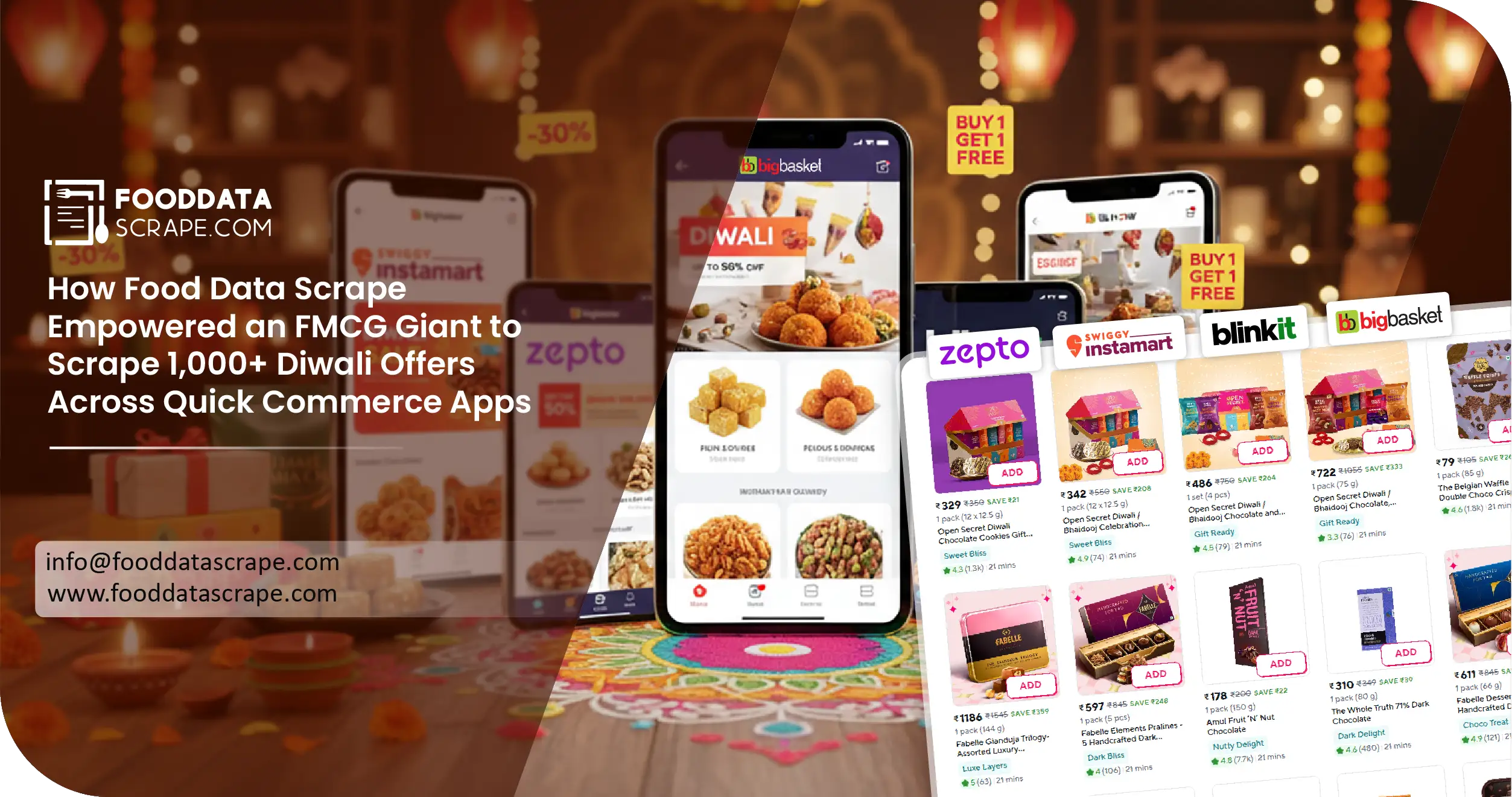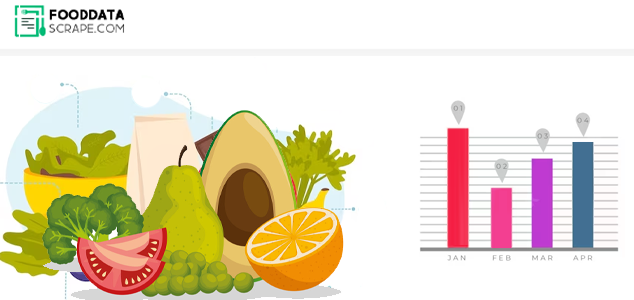The Client
The client is a well-established FMCG giant operating across India, known for its portfolio of over 50 household brands in packaged foods, beverages, and personal care. Each Diwali season, they launch promotional campaigns across eCommerce and quick commerce channels, targeting festive demand surges. However, their marketing and pricing teams faced a significant visibility gap: they couldn’t track how competing brands were adjusting discounts or bundling products across instant delivery apps. Manual monitoring was impossible given the scale and dynamic nature of festive offers. They needed automated data intelligence—a system capable of extracting detailed offer data from Blinkit, Zepto, Instamart, and BigBasket every few hours, filtered by product, category, price, city, and promotional type.
Key Challenges
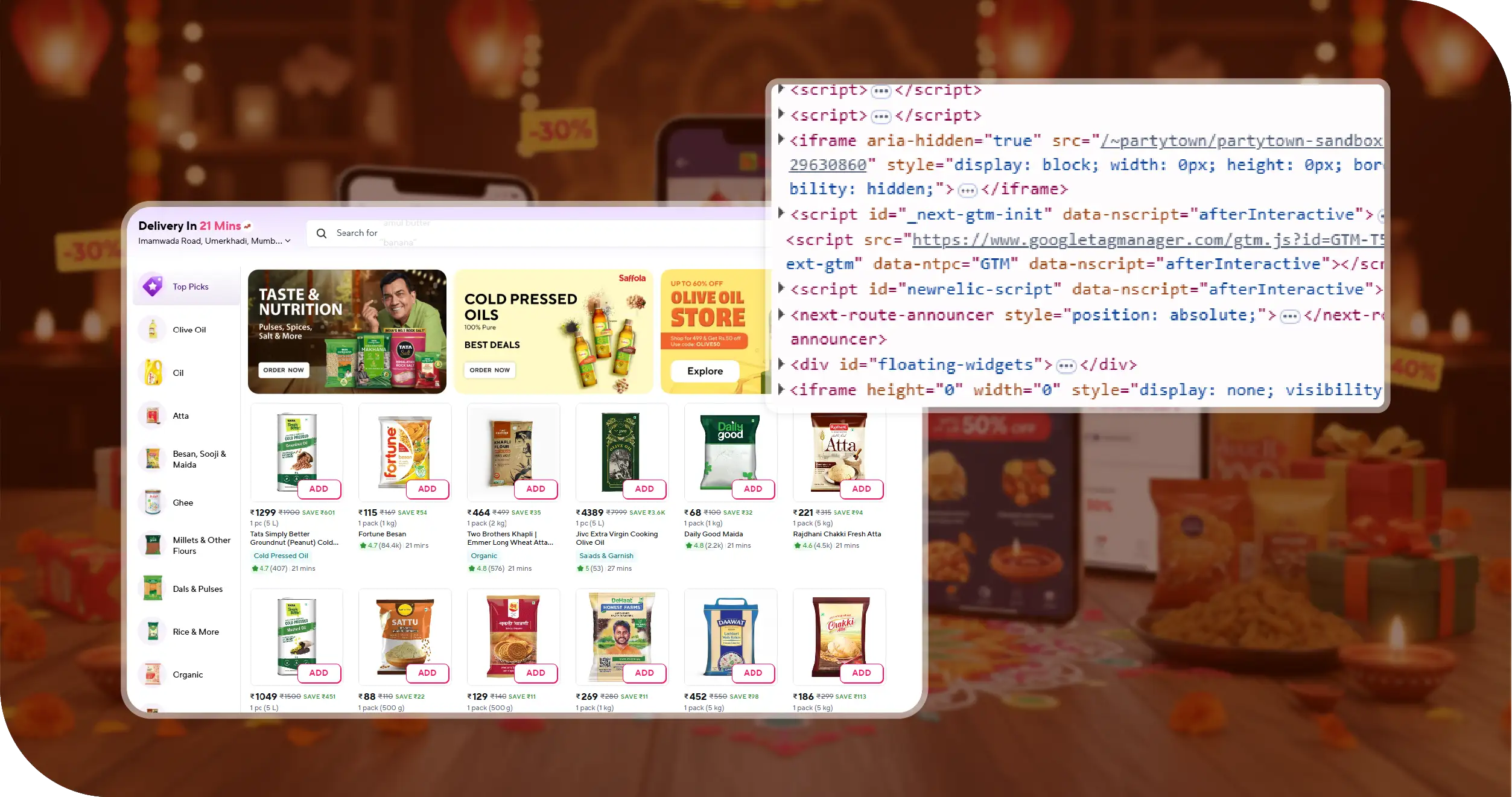
- Fast-Changing Offer Dynamics: Offers on quick commerce apps like Zepto or Blinkit often lasted for just 3–6 hours before being replaced by new promotions. Manual monitoring couldn’t capture such rapid fluctuations.
- Platform-Level Variations: Each app used different design layouts and data structures, making scraping inconsistent across APIs or web frameworks.
- Data Accuracy & Deduplication: The same product (for instance, a 1L cold drink bottle) might appear multiple times with different price tags, bundles, or cashback options depending on location or time of day. Ensuring data uniformity and accuracy was critical.
- City-Level Pricing Differences: Prices and discounts varied significantly between metro cities (like Mumbai or Delhi) and regional hubs (like Jaipur or Indore). The client needed geo-specific price benchmarking.
- Integration with Analytics Tools: The extracted data had to integrate smoothly with internal Power BI dashboards for campaign analysis and competitor benchmarking.
The Food Data Scrape Approach
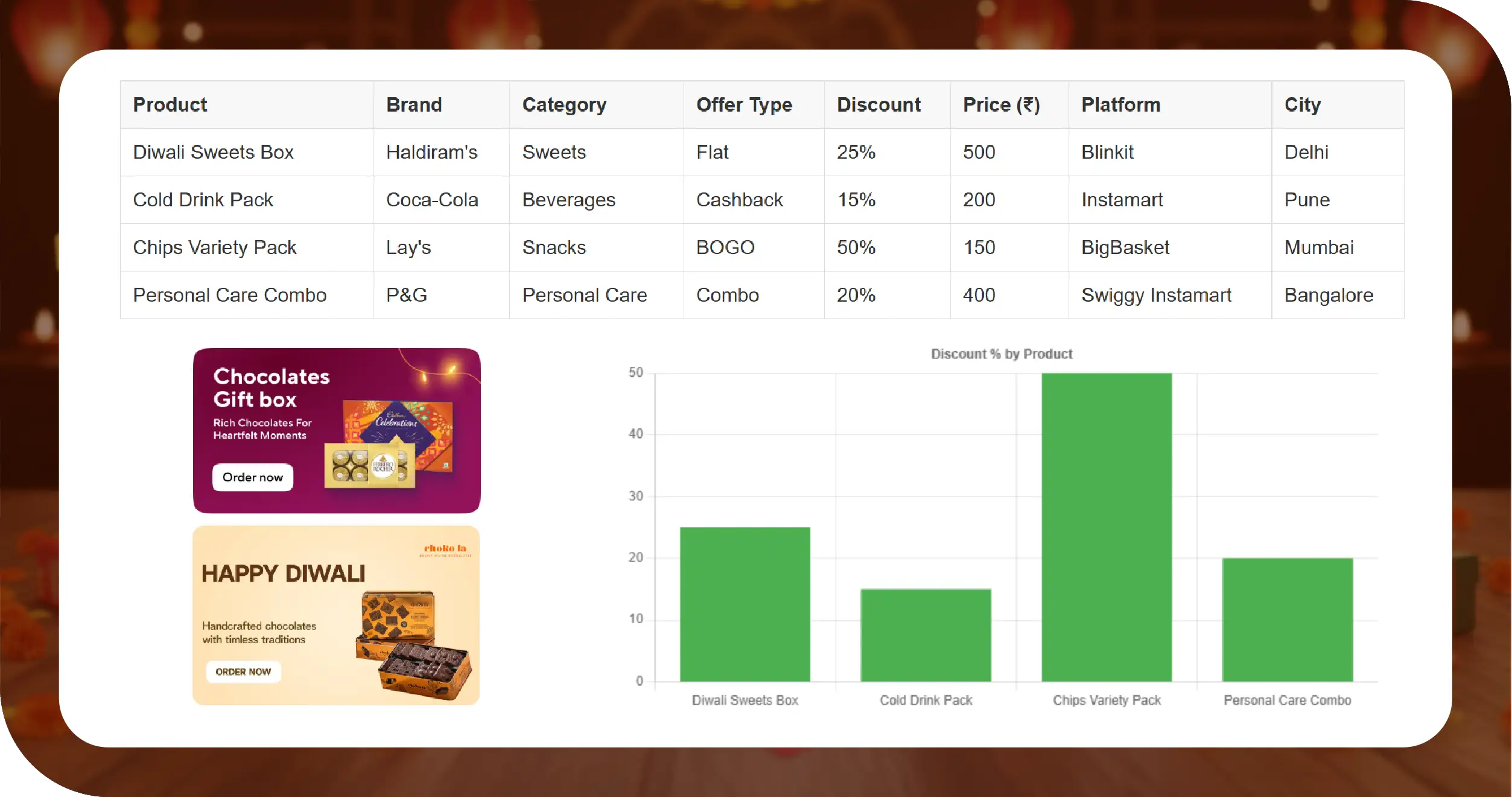
At Food Data Scrape, the goal was to go beyond static data collection and deliver real-time, actionable intelligence. The team deployed a customized suite of quick commerce scraping APIs designed specifically for festive offer tracking.
- Comprehensive Offer Extraction: To achieve this, custom-built crawlers were configured to extract live data every two hours from Blinkit, Zepto, Swiggy Instamart, and BigBasket. Each data record captured key attributes such as product name, brand, category (snacks, beverages, sweets, personal care, etc.), discount percentage, offer type (Flat, BOGO, Cashback, Combo, Flash Deal), original vs. offer price, app source, timestamp, and city. This automated setup created a live data feed of over 1,000 festive offers, continuously refreshing in near real-time to ensure the FMCG brand had the most accurate and up-to-date visibility into the Diwali 2025 quick commerce landscape.
- Geo-Mapped Offer Analysis: The data pipeline segmented all records by city and category, allowing the client to view region-specific offer patterns. For example, Blinkit in Delhi offered 25% off on sweets, while Instamart in Pune offered 15% cashback on cold beverages—revealing how regional demand shaped discounting strategy.
- Dynamic Visualization Dashboard: The scraped data was seamlessly integrated into a Grocery Price Tracking Dashboard built on Power BI, allowing the marketing and trade teams to gain actionable insights at a glance. The dashboard visualized top discounted products by category, price comparisons across platforms, hourly discount variation trends, and competitor-specific offer frequencies. With these insights, the client could quickly identify which rival brands were dominating the “Deals” section during peak Diwali traffic, enabling data-driven decision-making and agile campaign adjustments in real time.
Sample Data Snapshot

This dataset powered real-time insights into product-level competitiveness and regional price differences.
Methodologies Used
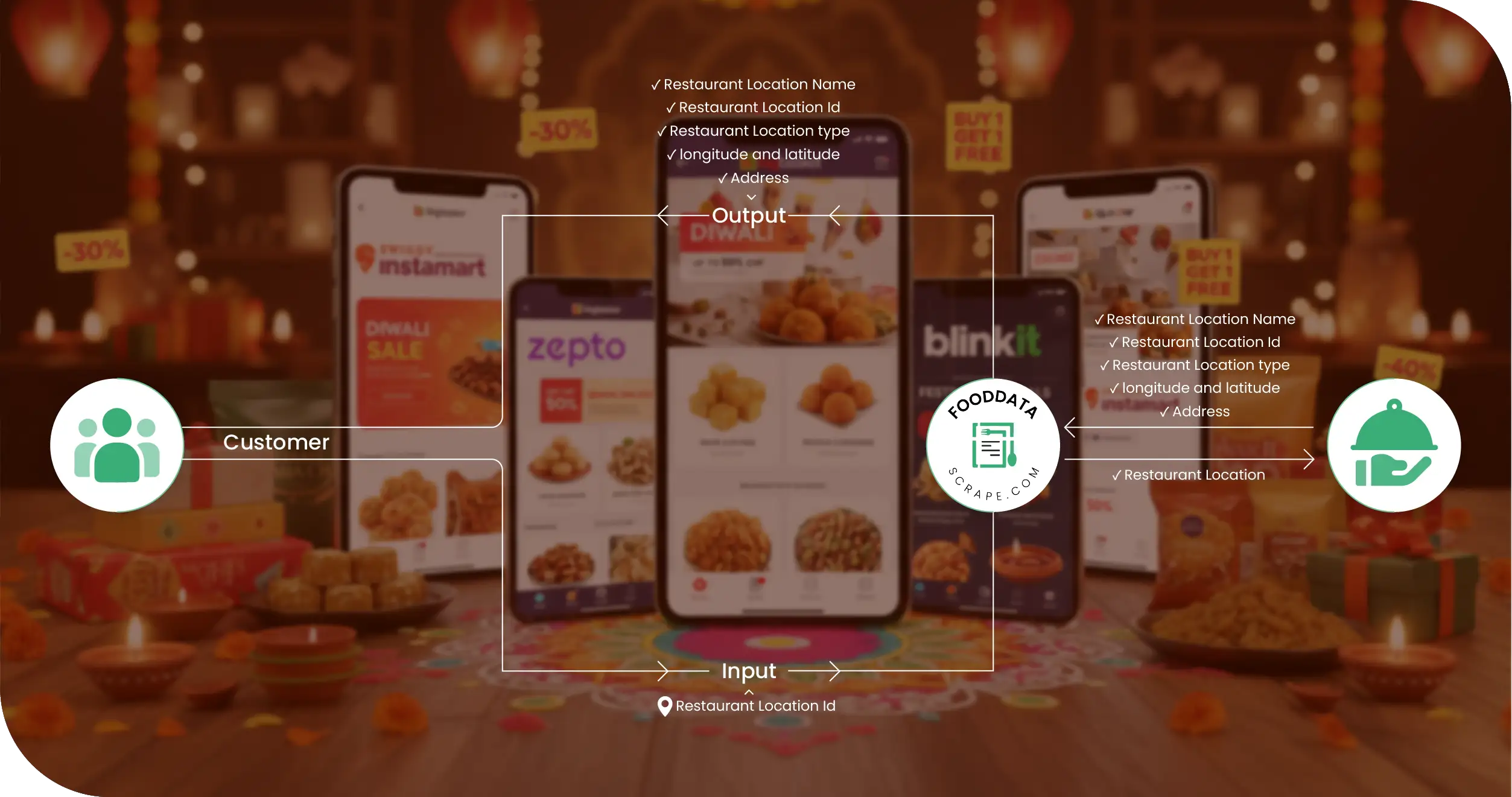
- Advanced Crawling Infrastructure: Using proprietary headless browser crawlers, our system mimicked user behavior within mobile app interfaces. This approach allowed scraping from progressive web apps (PWAs) and mobile endpoints that traditional bots can’t access. Each crawler captured offer details every 120 minutes, ensuring that even short-lived flash deals were recorded before expiry. The system also tracked offer start and end timestamps for historical reference.
- Data Standardization and Cleaning: Raw data extracted from four platforms had different formats and metadata tags. Food Data Scrape applied data normalization rules to unify fields like “discount,” “offer type,” and “brand.” Duplicate entries were automatically flagged and merged based on product identifiers, ensuring clean, structured data output ready for analysis.
- Cloud-Based Storage and Delivery: The structured dataset was stored in AWS S3 buckets, with scheduled exports to the client’s analytics tools via secure API endpoints. Each dataset was version-controlled to enable week-over-week trend comparison.
- Real-Time Analytics Integration: The client’s marketing analytics team connected their Power BI dashboards and Excel data models directly to the Food Data Scrape API, eliminating manual imports. This automation reduced report preparation time from hours to minutes.
- Quality Assurance & Compliance: Food Data Scrape implemented rigorous data accuracy validation and compliance protocols, including daily random sampling of 5% of the data for accuracy checks, verification of offer prices against screenshots to ensure audit traceability, and strict adherence to data privacy and platform compliance standards.
Advantages of Using Food Data Scrape
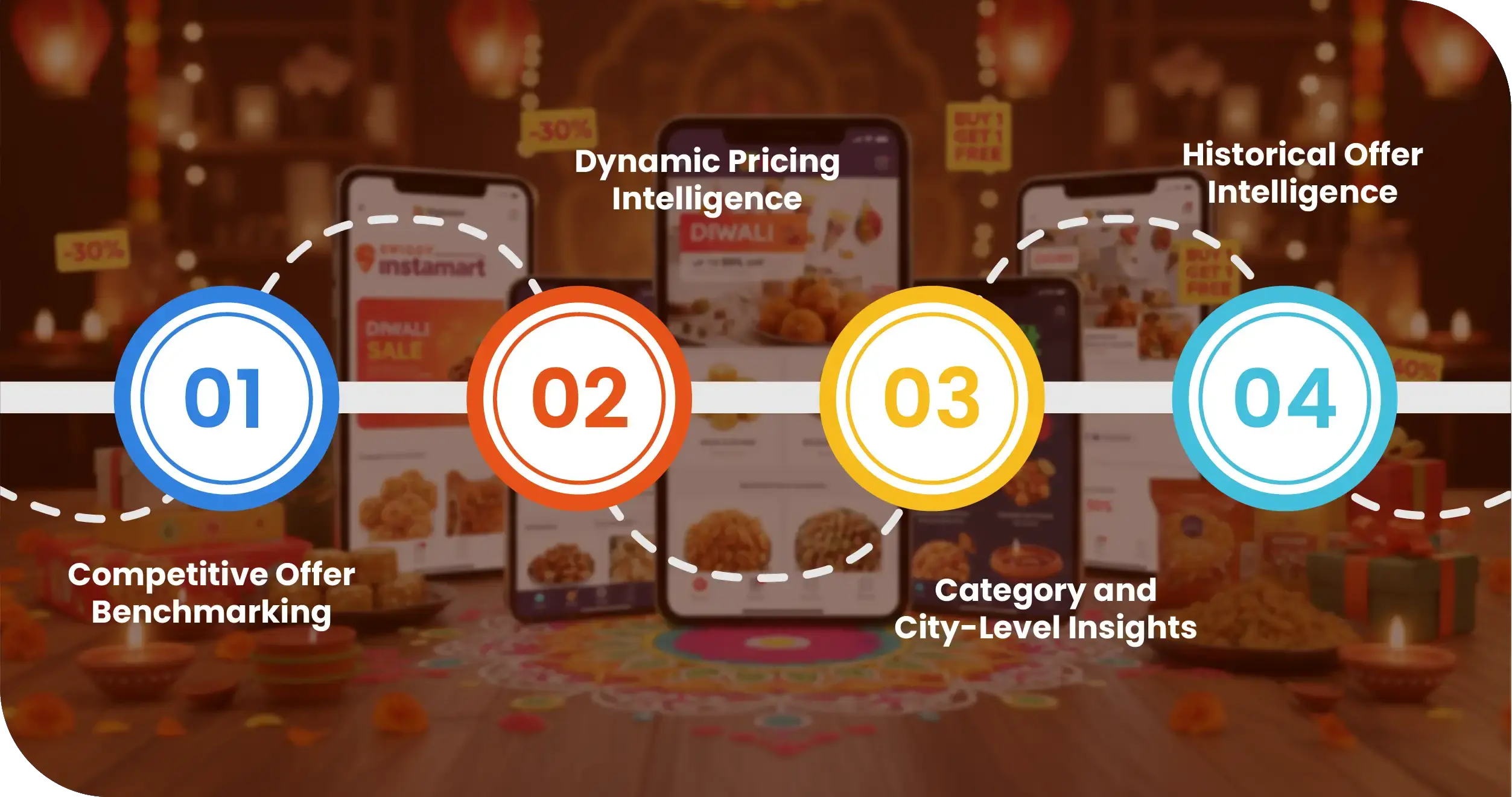
- Competitive Offer Benchmarking: The client was able to instantly compare category-wise discounts across Blinkit, Zepto, Instamart, and BigBasket, enabling them to identify which competitors were leading festive promotions. For instance, in the Snacks category, Blinkit offered the highest discounts of up to 30%; Instamart led in cashback offers for Beverages; and BigBasket dominated combo deals and bundle packs in the Personal Care segment.
- Dynamic Pricing Intelligence: By analyzing hourly price movements, the FMCG team identified three major price drop patterns: morning deals (6 AM–9 AM) focused on staples and breakfast items, midday flash sales targeted gifting categories like sweets and chocolates, and evening campaigns (6 PM–10 PM) promoted beverages and personal care bundles. Leveraging these insights, the client optimized their own discount scheduling, achieving a 22% improvement in campaign ROI during Diwali week.
- Category and City-Level Insights: Data segmentation showed that Tier-2 cities like Jaipur, Indore, and Surat saw higher discounts (average 19%) compared to Tier-1 metros (average 13%). This helped the brand reallocate ad spends to cities where festive buying intent was stronger.
- Historical Offer Intelligence: All extracted offers were archived, enabling year-over-year comparison for future festive campaigns. This dataset became a reference for the client’s 2026 Diwali planning and trade negotiation with eCommerce partners.
Sample Visualization

Below is an example of how the FMCG team used our data feed to analyze festive competition:
The dataset showed that Blinkit and Zepto dominated short-lived flash deals, while BigBasket focused on longer-duration offers aimed at planned shoppers.
Client Testimonial
“The Food Data Scrape team has completely changed how we view competitive pricing during festive seasons. Earlier, our teams manually checked offers once a day. Now, we receive automated, city-level datasets that show which competitor is running what discount every two hours. The visual dashboards helped us plan smarter campaigns and optimize ad budgets effectively. We now consider Food Data Scrape an essential data partner for every festive season.”
Head of Category Marketing, FMCG Division
Final Outcomes
The Diwali scraping initiative exceeded expectations and showcased how data-driven decision-making can redefine festive sales strategies in India’s fast-moving quick commerce market. Over a span of just 10 days, 1,000+ unique offers were captured across 8 major cities with an impressive 98.4% data accuracy, validated through automated sampling. The initiative delivered a 22% improvement in campaign ROI through better offer alignment, along with a 65% reduction in monitoring time thanks to API-based automation. Additionally, 100+ Power BI visualizations were auto-updated with real-time data feeds, providing stakeholders with instant visibility into market trends.
Strategically, this project enabled competitor benchmarking at the SKU level for snacks, beverages, and personal care products, significantly improving ad placement and bidding efficiency across quick commerce platforms. It also provided historical festive datasets to guide future marketing strategies, establishing Food Data Scrape as the client’s trusted long-term data partner in the quick commerce ecosystem.
The collaboration between the FMCG giant and Food Data Scrape proved that real-time web scraping isn’t just about data collection—it’s about unlocking actionable insights that directly influence sales performance, pricing strategies, and market positioning. By automating the extraction of Diwali offers, price drops, and category-level trends from Blinkit, Zepto, Instamart, and BigBasket, the client gained a comprehensive understanding of market dynamics during India’s busiest shopping week. Through API-driven automation, Power BI integration, and geo-level insights, Food Data Scrape transformed festive data chaos into clarity—strengthening the client’s position as a data-led FMCG leader ready for the next wave of quick commerce competition.






















































































